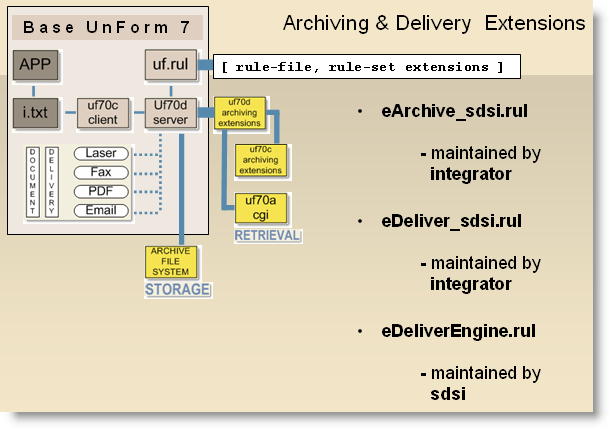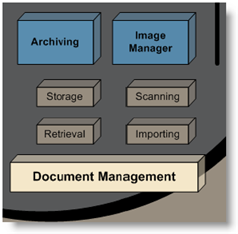|

ANNOUNCING as of Mid-July:
NEW eDeliver, eArchive Rule-Sets Available
After a 3-month period of beta implementation in the field, we are pleased to announce the
upcoming availability of standard template rule-sets to
enable e-Delivery and document archiving functions, including barcoding for
scan-recognition, with a minimum of
configuration effort. These rule-sets are designed to be "dropped in" to an
existing rule-file environment, and connected to existing form enhancement
rule-sets via a single merge statement.
It is expected that the files
will be available from our website by July 15.
Prior to mid-July,
please contact SDSI support at
support@synergetic-data.com to
request the files, which include a word document with instructions.
Why Rule-Set Templates ?
SDSI supports different
types of resellers and integrators, each with a varying level of need for
technical solutions when it comes to the implementation of UnForm features and
functionality. Because of a fairly heavy reliance on code-block script to
implement e-delivery or document archive property configuration, which often
requires at least some familiarity with I.T. scripting techniques, we decided to
create drop-in templates to ease the burden, when a fairly straight-forward
implementation is required.

HOW eDeliver WORKS
eDeliver is composed of a "shell" rule-set template and and a separate
"engine" rule-set. Think of the term "shell" as an
outer layer for settings, and the term "engine"
as the internal workings, under the hood, if you will.
The engine component, a
merge-able rule-set, is fixed and should not be changed, except from updates by
SDSI. It contains the code-block script in pre-job, pre-page, post-page and
post-job that processes for e-delivery based on the settings configured in the
shell.
The shell rule-set contains the
settings and properties needed to configure the delivery type and retrieval
method for e-delivery for a particular pre-existing form rule-set,
as well as other settings that relate to delivery wrapper properties.
A "parallel" rule-file structure
can be adopted, where, for each form in a pre-existing enhancement.rul file
needing to be configured for e-delivery, an e-delivery shell with the same name
is created in a parallel eDeliver rule file. It is thus possible to minimize the
intrusion of the e-delivery-related code and commands into a live customer
environment, and makes it easy to switch functionality on and off during
configuring, testing and updating.
Here are some detailed
specifications and requirements:
Delivery Functions:
-
EMAIL
-
FAX, including MS-Fax
-
Selective Print Copy
Delivery Address Retrieval Methods:
-
Method 1: Document Fixed
Location
-
Method 2: Document Delimited
Line
-
Method 3: Textfile Delimited
Fields
-
Method 4: ODBC
Features:
-
Logging with multiple detail
levels, including smtp message access.
-
Multiple delivery functions
for same rule-set, each with its own retrieval method.
-
Form-text-location driven
settings, as well as overrides for more custom control of the expressions
needed for property settings.
-
Prefixing and suffixing of
entity keys.
-
Full SDSI support for the
engine.
-
Great introduction and access
to advanced code-block constructs.
Requirements:
-
UnForm 7.0.10 or
higher
-
MS-Fax:
requires that both an UnForm windows support server and and an MS Fax server
be configured and running
-
Email:
network access to a mail server, and related UnForm configuration elements.
 HOW eArchive WORKS
eArchive is composed of a "shell"
rule-set template. Think of the term "shell" as an outer layer for
settings.
The shell rule-set contains the
settings and properties needed to configure the document archive properties used
by UnForm's document archiving component.
A "parallel" rule-file structure
can be adopted, where, for each form in a pre-existing enhancement.rul file
needing to be configured for archiving, an eArchive shell rule-set with the same
name is created in a parallel eArchive rule file. It is thus possible to
minimize the intrusion of the eArchive code and commands into a live customer
environment, and makes it easy to switch functionality on and off during
configuring, testing and updating.
For a detailed discussion of the
standard features of document archiving, see the section on archiving off the
main UnForm page.
Here are the detailed features
and requirements for the shell rule-set:
Features:
-
A code-block variable setting
for each of ten different archive document properties supported by the
current version of the document management archiving component.
-
A pre-configured archive
command, no change needed, referencing the code-block variable settings
mentioned above.
-
An ON/OFF setting at the top
of the rule-set for easy enable/disable.
Requirements:

| 
